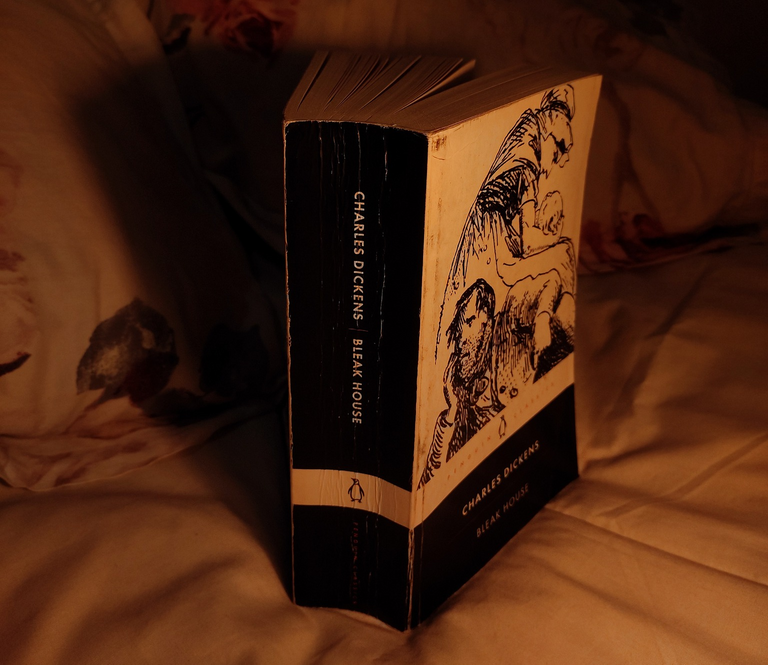Bleak House
By Charles Dickens

I’ve been around Bangladeshi law and how they are implemented in the judicial system, and was fortunate enough to study it a bit—and the post colonial ghosts that are still lingering are strong enough to be afraid of. Then I got a glance of the original face of it, the 19th century British law and court in action, through Dickens’ mocking eyes.
At the very first of the novel we are introduced to an old, poor lady, she attends the court every day, delusionally hoping to get a verdict for her suit. The day never comes. In fact, she inherited the suit from her keens, who used to oversee the same suit when they were alive and went insane and eventually died with the same hope she holds dear. Such is the court system and the only ones who benefit are the lawyers, who suck the clients dry and are happily willing to delay any chance of verdict and maximize their gain.
A famous fictional suit that has been running for generations is the central theme of the book. Jarndyce and Jarndyce. A suit anent family fortune, and who will inherit how much. There are many different wills, contradicting findings and wills and this is at such a point that no one really knows who is plaintiff or who is defendant.
People who are part of this lawsuit don’t have any clear idea about it either, and some of them, like one of the major characters, John Jarndyce, an elderly fellow, whose house is named ‘Bleak House’, the tile of the book, doesn’t give a damn about the suit and has taken to philanthropy.
This story revolves around the lawsuit, and the people it encompasses, as well as the futility of it— how suits like this ruin people and all the while, “Jarndyce and Jarndyce drones on.”
However, I can also say this is a story about butchered love and the prospect of happiness, sacrificed at the altar of custom. The longing it ignited, fuelling the total ruination of a family that would surely appreciate the time together, and would save a world of agony given a chance, and if not barred by a single lie. It is a tragedy in that sense and Dickens quickly dismisses the trigger that will ultimately cause the tragedy that happened and another one that is about to happen. Unable to put the blame, the reader then suffocates in misery and intense longing s/he shares with each member of the said family that failed to form in the first place.
This is also the story of Jo, a young kid without any father and mother, who lives on the street and happened to just appear there out of thin air one day—as many like him do indeed in our time and age as well—and the society would be better of if he didn’t commit the criminal act of existing. Society asks Jo to move on, as his presence is undesirable, to which Jo wonders aloud, “Where? I will move on, but where exactly?”
I find Jo’s perspective as that of an extraterrestrial nature—how it would traverse this world we fashioned, and try to make sense of our ridiculous social norms, sense of justice, and customs that benefit the wealthy and powerful. Perhaps Jo is Dickens himself while he uses this character to kick down doors of the sophisticated delicacy of then England. It’s certainly not the first time he introduced us to a misfortuned child.
The book is an epic drama of all of these intertwined, and then some more. I will remember characters like Skimpole, who thinks of himself as a child, even though he’s an old man, and wants nothing to do with worldly affairs. Or Mr. Turveydrop, to whom fashion and manners are the essences of a gentleman and aristocracy—what he calls, ‘deportment’, even though, in essence, he’s a parasite, living off his wife and son.
Though the size of the book resembles a brick, I would love to revisit it someday in the future. However, I fear whether my figurative heart is ready to dive into this again.
The title photo was taken by my friend and belongs to me



I'm a Dickens fan, and even though I've only read Bleak House once. I think it is my favorite Dickens book. Jarndyce v Jarndyce even recently appeared in a freewrite of mine! The book was long, but I love long novels. I'll read this one again I am sure.
Nice review!!
Ah, good to find a fellow Dickens lover on hive!
I haven't read many Dickens novels, this is my third actually but I can safely say this gotta be one of the finest books I've ever read.
I do love reading long books too. Although the current one Im reading aint that long, It's "The Tenant of Wildfell Hall" By Anne Bronte. So far it started really well.
Thanks for reading and dropping by Owasco. :)
I'm 2/3 the way through Atlas Shrugged. Haven't read Anne Bronte at all. Maybe it's time.
Wow, that's a feat indeed. I dropped Atlas Shrugged at 25%, I couldn't go on.
Anne Bronte is quite underrated and overshadowed by her sisters I'd say.
I loved Wuthering Heights. Someone wrote a sequel that was really good too.
Atlas Shrugged is very difficult reading at first, but once you get into her head, it gets really good. So many likenesses to today, with excessive social programs and regulations squelching innovations and production for instance. I recently learned that Rand was a freemason, and can now see her hints about that. I'm wondering what else in her philosophy is based in freemasonry. Was she another one of these predictive programming producers? There were so many...
Thank you for your help!Dear @notacinephile,Our previous proposal expired end of December and the Hivebuzz project is not funded anymore. May we ask you to review and support our new proposal (https://peakd.com/me/proposals/248)?